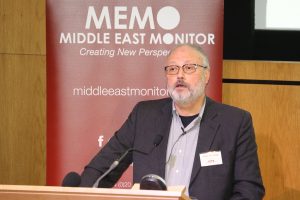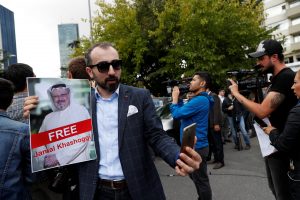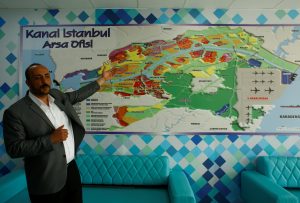
By Leah Millis and Bulent Usta
RIYADH/ISTANBUL (Reuters) – Saudi Arabia’s crown prince agreed on Tuesday there must be a thorough investigation into the disappearance of journalist Jamal Khashoggi, the United States said, after media reports that Riyadh will acknowledge he was killed in a botched interrogation.
Khashoggi, a U.S. resident and leading critic of the crown prince, vanished after entering the Saudi consulate in Istanbul on Oct. 2. Turkish officials say they believe he was murdered there and his body removed, which the Saudis strongly deny.
Overnight, Turkish crime scene investigators entered the consulate for the first time since Khashoggi’s disappearance and searched the premises for over nine hours.
U.S. President Donald Trump, who dispatched Secretary of State Mike Pompeo to Riyadh amid strained ties with its close ally, speculated that “rogue killers” may be responsible.
Pompeo met King Salman and Crown Prince Mohammed bin Salman to discuss the incident, which has sparked international outrage and brought renewed attention on the authoritarian kingdom’s human rights record.
He and Prince Mohammed “agreed on the importance of a thorough, transparent, and timely investigation”, a U.S. State Department spokeswoman said in Washington.
A Trump administration official said although Washington had a significant relationship with Riyadh “that doesn’t mean we’re in any way ignoring or downplaying this episode”. Those responsible must be held accountable, he said.
Pompeo is expected to go on to Turkey after dinner with the crown prince.
PAINTING OVER
In Istanbul, Turkish investigators were expanding their search to include the Saudi consul’s residence and consulate vehicles, Foreign Minister Mevlut Cavusoglu said.
Turkish President Tayyip Erdogan raised the possibility that parts of the consulate had been repainted since Khashoggi disappeared.
“The investigation is looking into many things such as toxic materials and those materials being removed by painting them over,” he told reporters.
A Turkish security source said the overnight search of the consulate had provided “strong evidence” but no conclusive proof that Khashoggi was killed in the consulate.
“However, there are some findings and they are being worked on,” he said.
Despite the outcry, the case poses a dilemma for the United States, Britain, and other Western nations. Saudi Arabia is the world’s top oil exporter and spends lavishly on Western arms. It is also a military ally and an opponent of Iran.
Riyadh has also faced criticism from some Western politicians and human right groups over the civilian casualties its warplanes have caused in the war in Yemen, in which it intervened three years ago.
Trump has threatened “severe punishment” if it turns out Khashoggi was killed in the consulate but ruled out canceling arms deals worth tens of billions of dollars.
Indicating unease over the Khashoggi case, international media and business executives are pulling out of an investment conference next week.
London Stock Exchange chief executive David Schwimmer joined the list on Tuesday, as did the CEOs of HSBC, Standard Chartered, Credit Suisse, and BNP Paribas, and David Bonderman, the billionaire chairman and founding partner of private equity firm TPG.
The City of London Corporation, which governs the capital’s financial district, said its Policy and Resources Chairman Catherine McGuinness would no longer attend, and Dutch Finance Minister Wopke Hoekstra said he most likely would not either.
Saudi Arabia has said it would retaliate against any pressure or economic sanctions.
COLLECTING EVIDENCE
CNN said on Monday that after denying for two weeks any role in his disappearance, Saudi Arabia was preparing to say he died in a botched interrogation.
The New York Times said Prince Mohammed had approved an interrogation or abduction of Khashoggi and the government would shield him by blaming an intelligence official. Saudi authorities could not be reached for comment.
Turkish authorities have an audio recording indicating that Khashoggi was killed in the consulate, Turkish sources have told Reuters.
The Turkish team that searched the consulate took away soil samples and a metal door from the garden, a Reuters witness said, but a senior official acknowledged the difficulty of collecting evidence 13 days after the incident.
The Turkish security source confirmed that Saudi Consul General Mohammad al-Otaibi left Istanbul on Tuesday, returning to Riyadh, hours before his residence was set to be searched.
He said Turkish authorities had not asked him to go, adding: “He wanted to leave”.
“WRECKING BALL”
Khashoggi moved to Washington last year fearing retribution for his criticism of Prince Mohammed, who has cracked down on dissent with arrests.
Many members of the U.S. Congress have strongly criticized the kingdom.
Republican Senator Lindsey Graham, describing himself as a long-time supporter of Riyadh, called Prince Mohammed “a wrecking ball” and accused him of Khashoggi’s killing.
“This guy’s gotta go,” he said on Fox News.
Graham told Fox News Radio separately he was worried about one of Khashoggi’s children still living in Saudi Arabia and had offered to help his “three American citizen children”.
Khashoggi moved to Washington last year fearing retribution for his criticism of Prince Mohammed, who has cracked down on dissent with arrests.
The Saudi riyal rebounded early after falling to its lowest in two years over fears that foreign investment could shrink. Saudi stock index initially dropped 3 percent but ended up after state-linked funds came in to buy toward the close.
(Additional reporting by Yesim Dikmen and Sarah Dadouch in Istanbul, Orhan Coskun, Gulsen Solaker, Ece Toksabay and Tuvan Gumrukcu in Ankara, John Revill in Basel, Oliver Hirt in Zurich, Lawrence White in London, Stephanie Nebehay in Geneva; Writing by Ece Toksabay, Daren Butler and Stephen Kalin, editing by Angus MacSwan)











